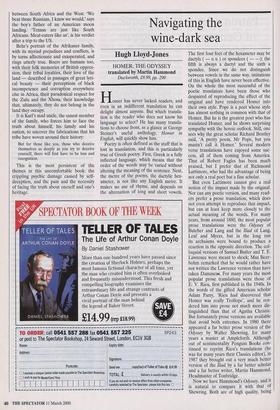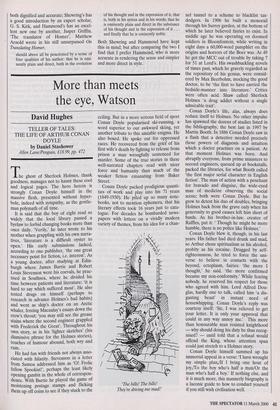Navigating the wine-dark sea
Hugh Lloyd-Jones
HOMER: THE ODYSSEY translated by Martin Hammond Duckworth, £9.99, pp. 290 Homer has never lacked readers, and even in an indifferent translation he can delight almost anyone. But which transla- tion is the reader who does not know his language to select? He has many transla- tions to choose from, as a glance at George Steiner's useful anthology, Homer in English, will quickly show him.
Poetry is often defined as the stuff that is lost in translation, and this is particularly true of Greek poetry. First, Greek is a fully inflected language, which means that the order of the words may be varied without altering the meaning of the sentence. Next, the metre of the poems, the dactylic hex- ameter, is not like any English metre. It makes no use of rhyme, and depends on the alternation of long and short vowels The first four feet of the hexameter may be dactyls ( — u u ) or spondees ( — —); the fifth is always a dactyl and the sixth a spondee. Since we do not distinguish between vowels in the same way, imitations of this in English have never been effective. On the whole the most successful of the poetic translators have been those who despaired of reproducing the effect of the original and have rendered Homer into their own style. Pope is a poet whose style has almost nothing in common with that of Homer. But he is the greatest poet who has translated Homer, and he shows surprising sympathy with the heroic outlook. Still, one sees why the great scholar Richard Bentley said, 'A pretty poem, Mr Pope, but you mustn't call it Homer.' Several modern verse translations have enjoyed some suc- cess, all of them coming from America. That of Robert Fagles has been much praised, but I prefer that of Richmond Lattimore, who had the advantage of being not only a real poet but a fine scholar.
But even Lattimore cannot give a real notion of the impact made by the original. Nor can any poetic version, and many read- ers prefer a prose translation, which does not even attempt to reproduce that impact, but can at least keep more closely to the actual meaning of the words. For many years, from around 1880, the most popular prose translations were the Odyssey of Butcher and Lang and the Iliad of Lang, Leaf and Myers, but in the long run its archaisms were bound to produce a reaction in the opposite direction. The col- loquial versions of Samuel Butler and T. E. Lawrence were meant to shock; Max Beer- bohm remarked that he would rather have not written the Lawrence version than have taken Damascus. For many years the most popular prose translations were those of E. V. Rieu, first published in the 1940s. In the words of the gifted American scholar Adam Parry, `Rieu had discovered that Homer was really Trollope', and he ren- dered him into prose not much more dis- tinguished than that of Agatha Christie. But fortunately prose versions are available that avoid both extremes. In 1980 there appeared a far better prose version of the Odyssey by Walter Shewring, for many years a master at Ampleforth. Although out of sentimentality Penguin Books con- tinued, to reprint Rieu's translations (he was for many years their Classics editor), in 1987 they brought out a very much better version of the Iliad by a far better scholar and a far better writer, Martin Hammond, Headmaster of Tonbridge. Now we have Hammond's Odyssey, and it is natural to compare it with that of Shewring. Both are of high quality, being both dignified and accurate; Shewring's has a good introduction by an expert scholar, G. S. Kirk, and Hammond's has an excel- lent new one by another, Jasper Griffin `The translator of Homer', Matthew Arnold wrote in his still unsurpassed On Translating Homer,
should above all be penetrated by a sense of four qualities of his author: that he is emi- nently plain and direct, both in the evolution of his thought and in the expression of it, that is, both in his syntax and in his words; that he is eminently plain and direct in the substance of his thought and in the expression of it . . . and finally that he is eminently noble.
Both Shewring and Hammond have kept this in mind; but after comparing the two I find that I prefer Hammond, who is more accurate in rendering the sense and simpler and more direct in style.



































































 Previous page
Previous page